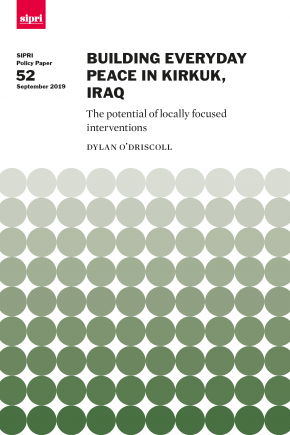Building Everyday Peace in Kirkuk, Iraq: The Potential of Locally Focused Interventions
Since the end of Ottoman control of the territory of Iraq and the establishment of the Kingdom of Iraq under British Administration in 1921, conflict has emerged in Kirkuk over political and territorial control, and this conflict intensified after the 2003 United States-led invasion of the country. As a result, Arab, Kurdish and Turkmen politicians have been competing for power with little sign of compromise. Conflict in Kirkuk mirrors and often feeds into ethnosectarian competition in the central government, making peace in Kirkuk important to the country as a whole. Despite the failure of elites to demonstrate a willingness to compromise in Kirkuk, peacebuilders, policymakers and donors have focused considerable attention on the elite level and have ignored the local side of peacebuilding, where there is potential to create positive change.
In order to better understand that potential, survey research was undertaken with 511 participants in the main bazaar in Kirkuk, a key location for socializing between people from different ethnosectarian groups. The research explored the local side of peacebuilding and the influence that time, space and multiple layers of privilege have on everyday peace and everyday conflict in Kirkuk.
By exploring how, when and by whom acts of everyday peace and conflict are performed, this paper highlights how interventions can be developed to limit the drivers of conflict and maximize the drivers of peace. A more thorough understanding of these issues allows for the development of policies that are better targeted to reduce inequalities between ethnosectarian groups and develop local peace. The paper offers recommendations for both local and international peacebuilders, highlights why donors should fund locally focused peacebuilding efforts, and encourages national actors to develop inclusive security solutions. Thus, it is relevant to those working on peacebuilding in Iraq, those working on local peacebuilding, and those interested in how the ‘local turn’ in peacebuilding literature can inform policy.
This paper highlights five key areas where attention should be focused in order to build acts of everyday peace in Kirkuk: (a) language; (b) intergroup relations; (c) acts of everyday conflict; (d) use of space; and (e) privilege. Based on these themes, recommendations are offered for ways to strengthen intergroup relations, limit the role of social privilege as a driver of conflict, build peace from the bottom up, target the most marginalized, and reduce inequalities between and within ethnosectarian groups—in short, to inhibit the drivers of conflict and enhance the drivers of peace.
1. Introduction
2. Background: Relations between ethnosectarian groups in Kirkuk
3. Local-level peacebuilding opportunities in Kirkuk
4. Conclusions and recommendations

